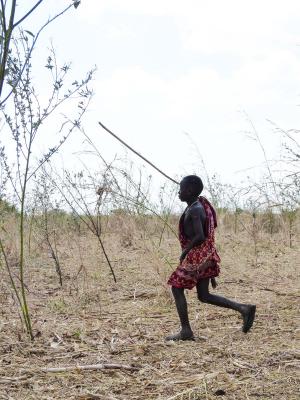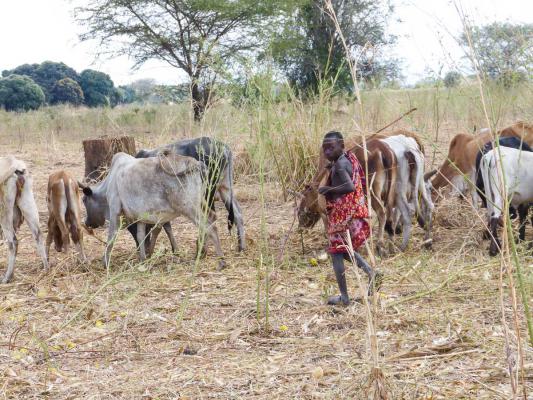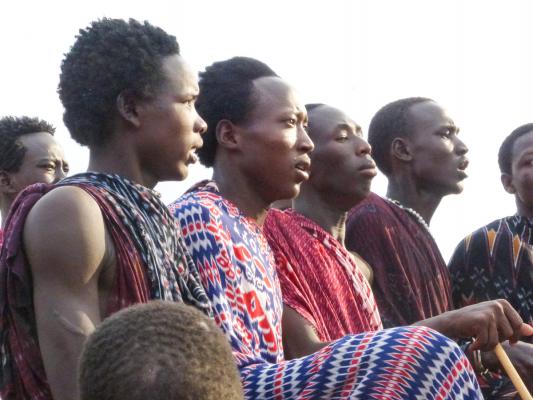Na omzwervingen doorheen verschillende jobs in de cultuur- en sociale sector besliste Ebe dat het hoog tijd was om na te denken over wat ze écht wilde doen.
Tanzania allows Maasai land to be stolen under the guise of development
Tanzania is receiving development assistance to further develop the agricultural sector through public-private cooperation. The projects are being promoted under the premise that fertile land is abundant but, in practice, this land is almost always occupied. This means that large-scale agricultural projects are driving people off their land. An example is the case of the Maasai of Mabwegere, who are being dealt with harshly.
Land, water and access to natural resources become scarcer due to climate change, population growth, and the increasing demand for land for investment.
The Tanzanian government wants to develop the country by attracting investors, and for that it needs land.
Maasai unwelcome in their own village
The village of Mabwegere in the district of Kilosa in the Tanzanian province of Morogoro is home to 4105 nomadic pastoralist Maasai, while the surrounding villages are made up of crop farmers.
Although Mabwegere is an officially registered village and the Maasai have been living there since the 1950s, the elites and the local government are abusing their power so as to drive out the Maasai and to drive a wedge between the crop farmers and the cattle herders. They want to use the land for speculation or for growing crops.
This fuels the conflicts between these two groups, who are given less and less land and living space.
The first time the local authorities tried to evict the farmers was in January 2009. We interviewed nine men and seven women from the village who were there at that time. For their own safety, they prefer to remain anonymous.
‘The district administration gave the order to seize the cattle. They wanted to cash in the cattle and evict herders to give the land to agriculturists,’ says one of the village elders.
During the large-scale operation to remove pastoralists from Kilosa, police and paramilitary units throughout the district confiscated their livestock.

Young Maasai herder in Mabwegere
© Ebe Daems
The villagers say 5000 cows and goats were seized in their village alone, but the exact number is difficult to determine. A report of the International Work Group for Indigenous Affairs (IWGIA) shows estimates ranging from 20,000 to 200,000 or 300,000 confiscated animals in the entire district.
‘Although we paid the fines, we never saw our cattle again. The police sold every animal at a large cattle market in Dar es Salaam.’
‘We tried to stop them, but the police held us at gunpoint and fired warning shots. They bombarded us with teargas and beat people,’ says a villager.
‘There were at least 200 of them and there were also people from neighboring villages with whom we don’t get along.’
All the cattle were herded into large stables. The villagers had to pay a fine of 30,000 Tanzanian shillings, about 15 Euros, for each cow and 5 Euros for a goat or sheep.
‘Although we paid the fines, we never saw our cattle again. They sold every animal at a large cattle market in Dar es Salaam,’ says one of the villagers.
Land grabbing
The Maasai’s livelihood depends entirely on their cattle. At the time of the seizure, a cow was worth about 500 Euros on average. People were left in poverty.
‘We had no money to buy cattle. Some borrowed cows from relatives to survive, but those who were not so lucky still have nothing today,’ said one of the villagers.
‘The cows were all we had,’ says one of the women from the village. ‘We cannot grow crops. Our sons moved to the city. They now live far away in Iringa.’
Blocking access to water may be a strategic move to prevent the Maasai from returning to their territory.
Farmers from neighboring villages used the chaos to their advantage by occupying Maasai land and using it to grow crops.
Much of the land they confiscated is located at the river and drinking spots.
The farmers let the IGWIA know that blocking the herders’ water access was a strategic move to prevent them from returning to their territory.
One of the women shows a plastic bottle that appears to be filled with lemonade: ‘This is our water. We no longer have proper water. The cattle can’t drink it. It makes us ill, too.
Whenever we have our blood tested, the results show we have typhoid. When we want to let our cattle drink from the rivers, the farmers who are now growing tomatoes and sugarcane stop us. We have to get our water from puddles.’

The women show their drinking water.
© Ebe Daems
‘We sued those farmers but lost the case, even though in 2010 the Supreme Court ruled that Mabwegere officially belongs to us’, says one of the men from the village.
‘We have been living here since 1956. The local government is ignoring court orders.’
‘The government considers this a good region for farming rice. There are important people in the government who are particularly interested in this land.’
One of the reasons why the local authorities ignore court orders may be that the district administration has already given parts of the region to influential people without following the legal procedures.
‘There are rich people from the cities that want our land’, says one of the older women from the village. ‘What are they expecting? That we’re going to live in trees like baboons or birds?’
According to the men from the village, some of those who want their land are in the government themselves: ‘The government considers this a good region for farming rice. There are important people in the government who are particularly interested in this land.
That’s why they are turning our neighbors against us. They are conducting a hate campaign, portraying us as violent and uncivilized.’
Murder, arson and rape
This hate campaign also fits in with the policies and discourse of Jakaya Kikwete, who was president of Tanzania until late 2015. Kikwete considered the lifestyle of the nomadic cattle farmers unproductive and outdated, something that didn’t belong in a modern state.
He stated in his speech at the start of his tenure that the people of Tanzania should go from being nomadic herders to become modern sedentary farmers.
FOTO Young Maasai herder in Mabwegere
© Ebe Daems
‘They came with clubs, spears and machetes. They tried to seize our cattle. They torched houses and raped women.’

Young Maasai herder in Mabwegere
© Ebe Daems
Local politicians continue to incorrectly label the nomadic cattle farmers as illegal immigrants who cause conflicts.
In January 2015, the conflict escalated further when residents of the neighboring villages invaded Mabwegere.
‘They came with clubs, spears and machetes. They tried to seize our cattle. They torched houses and raped women.
The IWGIA report that six women were raped, the villagers themselves say there were four. ‘The real number is much higher’, says Maasai leader Chris.
Chris is not his real name, because he, too, fears persecution. He represents 200,000 people and, in the past, he has reported to the UN about the situation in Tanzania.
‘Women in my community can’t say they’ve been raped. They feel it would damage their reputation’, says Chris.
Chris believes those who attacked the village were trained units.
‘The elite are financing these conflicts. They want our land in order to sell it to investors. They finance the farmers from neighboring villages and train them to fight. This is not just a conflict, it’s war.’
‘The elite are financing these conflicts. They want our land in order to sell it to investors. They finance the farmers from neighboring villages and train them to fight. This is not just a conflict, it’s war.’
‘Women and children are the most vulnerable during such violence’, say the women. ‘The men are often away from home and can stay in the cities or in the forest, but we are always at home to take care of the children. We have nowhere to go.’
The trauma runs deep. The women of the village cry when talking about the seizure of the cattle in 2009 and about the more recent rapes. A recurring theme is their indignation about the fact that they do not get help in coping with the traumatic events.
‘After the invasion in 2015, the representative of the regional government even came to the village, but nothing happened. Everything stayed the way it was and no one was punished’, says a resident.
Since the cattle seizure, there has been a culture of impunity. The cattle farmers sued at different levels of government, but to no avail. They were given no protection at all.
The Tanzanian newspaper Daily News did report this February that the Prevention and Combating of Corruption Bureau has started investigating politicians and others who may have spurred on the conflict.
Land disputes and demarcation
Mabwegere is not an isolated case. The IWGIA has gathered statements from cattle herders in about twenty villages in five provinces of Tanzania. The general narrative is always the same.
Tanzanian NGO HAKIARDHI reported in 2012 that, in the span of a year, there were 1825 land disputes in courts and, in sixty percent of those, a powerful investor was involved.
The village of Mabwegere is located in the Southern Agricultural Growth Corridor (SAGCOT). The government, donors and the private sector want to realize this fertile region’s agricultural potential and modernize it through public-private cooperation, focusing on small-scale farmers.

Maasai boys become warriors during the rite of passage, which takes place every three years.
© Ebe Daems
This supports the New Alliance for Food Security and Nutrition (NASFN), an initiative launched in 2012 by the G8 in order to pull 50 million people in Africa out of poverty and hunger through public-private cooperation in the agricultural sector.
The initiative is supported by the EU, the US, the UK, the World Bank and the Bill & Melinda Gates Foundation, among others.
In this case, the demarcation is not intended for securing the rights of the villagers, but for providing security to investors.
The NAFSN projects are aimed at the SAGCOT region.
The Tanzanian government promised to demarcate the SAGCOT region’s land in order to obtain the support of the NAFSN.
This would allow the government to create a mechanism to provide investors with land in a correct and transparent way.
A clear demarcation could help villagers secure the rights to their land. However, in this case, the demarcation is not intended for securing the rights of the villagers, but for providing security to investors.
Paolo De Meo of Terra Nuova, an NGO cooperating with the Hands on the Land coalition, considers EU policy partially responsible for the land grabbing.
‘Nomadic cattle farmers are one of the most vulnerable communities, because their lifestyle is not productive from an industrial perspective.’
‘EU support of African agriculture is increasingly focused on expanding an industrial agricultural model. This makes nomadic cattle farmers one of the most vulnerable communities, because their grasslands are considered unused and because their lifestyle is not productive from an industrial perspective.’
Edward Louré of the Tanzanian NGO Ujamaa Community Resource Team (UCRT), which supports the rights of nomadic cattle farmers and hunter-gatherers, is also concerned.
‘The NAFSN is receiving much support from the World Bank. We are worried because the project documentation for the NAFSN does not mention the rights of indigenous peoples. This is unusual for the World Bank. They know much about the rights of indigenous peoples.
Their silence in this matter leads us to assume that they are allowing the ousting of local communities to make room for big investors.’
Land that isn’t there
Tanzania divides all land into three categories. Under SAGCOT, the only category accessible to investors is general land, but this only constitutes two percent of the land. The other two categories are village land and reserved land.
The president can convert village land into general land if this serves public interest, such as in agricultural projects. SAGCOT wants to increase the percentage of general land in the region from 2 to 20 percent.
This would free up 350,000 hectares of land for agriculture and would require converting village land or reservations to general land.
‘The World Bank does not want to be accused of facilitating land grabs.’
Professor Lusugga Kironde of the Ardhi University conducted a non-published study for the World Bank concerning land matters in the SAGCOT region.
‘The World Bank requested that study because they wanted to know if the land is really available. We believe it is not. The World Bank wants to know which steps they need to take in order to acquire the land. They do not want to be accused of facilitating land grabs.’

Maasai boys become warriors during the rite of passage, which takes place every three years.
© Ebe Daems
‘The conflicts between farmers and nomadic pastoralists are a clear sign that there is no free and available land’, says Professor Kironde.
‘If the land were available, we would not be seeing these conflicts. Farmers would not be taking the nomadic pastoralists’ land if they had enough land available themselves.
The conflicts are growing in frequency and lethality. A project like SAGCOT is impossible without taking families’ land.’
Investors who want land have to go through the Tanzanian Investment Center (TIC). A TIC employee, who wished to testify only anonymously, also agrees that there is no land available.
‘Now that they are revising policy, there is a strong lobby that wants to convert village land to general land in order to make it available to investors. If this happens, it will lead to large-scale land grabs.’
‘There is no indisputably available land. The procedures to make land available for investing are time-consuming, because the village land needs to be converted into general land. The investors have to wait for months until the conversion is complete.’
National policy concerning land is currently being revised, which worries Professor Kironde.
‘There is much pressure because it is difficult for investors to gain access to land. Now that policy is being revised, there is a strong lobby that wants to convert village land to general land in order to make it available to investors. If this happens, it will lead to large-scale land grabs.
It will take some time, because converting all land to general land would require changes to the constitution. However, the process could become more simplified and faster.
‘It would be good if they could shorten the procedures for conversion, for instance by involving the Minister for Lands rather than the President’, says the TIC employee.
No budget for proper consultations
State organization RUBADA (Rufiji Basin Development Authority) is in charge of the demarcation of the land under SAGCOT. This organisation visits villages to demarcate land and, at the same time, tries to attract investors.
RUBADA made Tanzanian headlines last year because of a corruption scandal involving the disappearance of about one million Euros of development and investment money.
‘One of our main goals is attracting investments in the SAGCOT region’, says RUBADA Director for Planning and Investment John Rutabwaba.
A RUBADA employee told academic Mikael Bergius that they handle as many villages as possible each day. Bergius has been researching agricultural development in Tanzania for decades at the Norwegian University NMBU and for the Oakland Institute thinktank.
‘We cannot adequately consult the villagers because we lack the budget’, says Rutabwaba. ‘We are a governmental organisation, but the government doesn’t support us. Luckily, we’ve gotten some help from the UNDP, otherwise we would not be able to do anything at all.’
Ebe Daems & Kweli Ukwethembeka Iqiniso
This article was created with the support of Journalismfund.eu
Translation coordinated by Koen Van Troos
Maak MO* mee mogelijk.
Word proMO* net als 2793 andere lezers en maak MO* mee mogelijk. Zo blijven al onze verhalen gratis online beschikbaar voor iédereen.
Meer verhalen
-
Report
-
Report
-
Report
-
Interview
-
Analysis
-
Report

















 Oxfam België
Oxfam België Handicap International
Handicap International